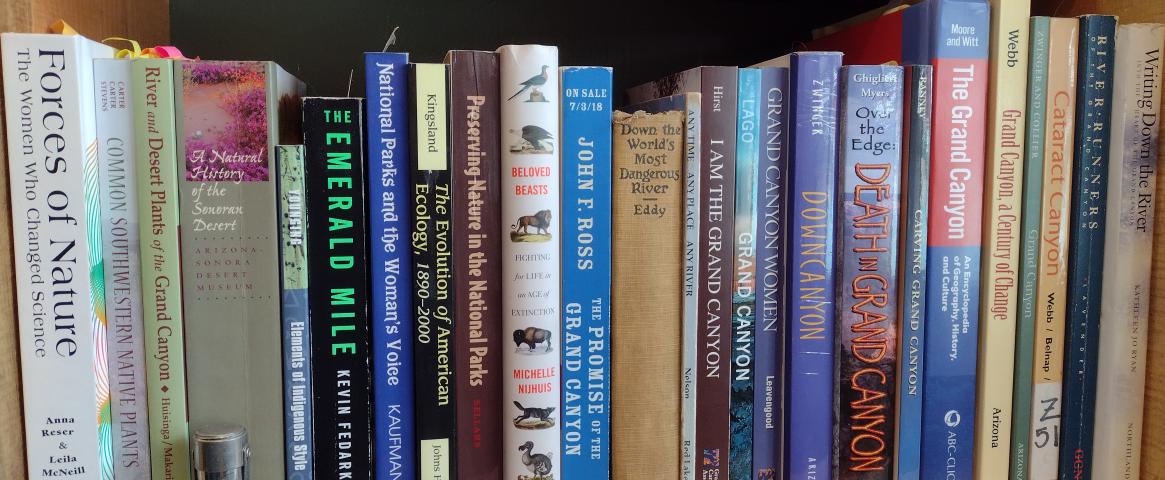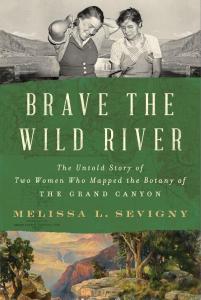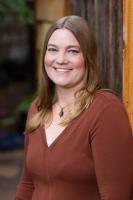
Melissa Sevigny—Brave the Wild River: The Untold Story of Two Women Who Mapped the Botany of the Grand Canyon
THE UNTOLD STORY OF TWO WOMEN
WHO MAPPED THE BOTANY OF THE GRAND CANYON
Melissa L. Sevigny
W.W. Norton, May 23, 2023
Hardcover $30, ebook $14.99, audiobook $20.99
Hardcover ISBN-13: 9780393868234
Ebook ASIN: B0BHPRKW1Y
Audiobook ASIN: B0C2JKSTH8
Sevigny reports:
In 2018, I went to see an exhibit of Grand Canyon photographs at Northern Arizona University. There, on the wall, was a black-and-white photograph of the botanists Elzada Clover and Lois Jotter on their 1938 journey down the Colorado River. I knew they had made the first-ever formal plant collection in the Grand Canyon, but not much else. Hardly anything had been written about them. I realized if I wanted to know more, I’d have to write the story myself.
Relying on their diaries and letters, I published Clover and Jotter’s story as a longform article in the Atavist Magazine in 2019, but I wasn’t done it with it yet. There was much more to say about botany, science, and the sexism they faced. I connected with an agent, Laurie Abkemeier, after she shared my article on Twitter, and we worked together to write a proposal for a book. Laurie sold the proposal to W.W. Norton in 2020.
I had intended to start my book research by visiting several university archives that housed material about the 1938 expedition, but the pandemic changed my plans. With the country shut down, I had to start working on the book with just the diaries and letters I had already copied. In a way, that worked out for the best, because my first draft centered the women’s voices. Later, I was able to access the archives and fill in the gaps.I also interviewed descendants and former students of my characters, and I did something I never expected to do as part of book research: I rafted the Grand Canyon with a botany crew. I funded that trip by volunteering my time to dig up an invasive plant species.
Brave the Wild River is my third book, but different from the first two, Under Desert Skies and Mythical River, in the intensity of the experience. I wrote on weekends, during the isolation of the pandemic, with a kind of compulsion that showed up in my dreams at night. That’s my advice to aspiring writers: find the story that grabs you and doesn’t let go.
Contact info:
- Melissa Sevigny, 520-440-2926, melissa.l.sevigny@gmail.com, https://melissasevigny.com/, @MelissaSevigny
- Book: https://wwnorton.com/books/9780393868234, https://melissasevigny.com/books/brave-the-wild-river/
- Publicist: Will Scarlett, wscarlett@wwnorton.com
- Agent: Laurie Abkemeier, laurie@defliterary.com
NASW members: will your book be published soon? Promote it by submitting your report for Advance Copy.
Tell your fellow NASW members how you came up with the idea for your book, developed a proposal, found an agent and publisher, funded and conducted research, and put the book together. Include what you wish you had known before you began working on your book, or had done differently.
See https://www.nasw.org/advance-copy-submission-guidelines.
View Advance Copy archives at https://www.nasw.org/member-article/advance-copy.
Thinking of writing a book? If you are a NASW member, you may access a list of more than 200 books and online resources to help you craft your book proposal, find an agent and funding sources, negotiate your contract, learn about self-publishing, publicize and market your book, and more at https://www.nasw.org/article/write-book.
Send book info and questions about book publishing to Lynne Lamberg, NASW book editor, llamberg@nasw.org.
Follow @LynneLamberg on Twitter for news about science/medical books, writing, and NASW authors.
Banner image adapted from original photo by Melissa Sevigny.
NASW members: Share photos of your office bookshelves for use on our website. Upload photos to bit.ly/naswpicsubmit.
Advance Copy
The path from idea to book may take myriad routes. The Advance Copy column, started in 2000 by NASW volunteer book editor Lynne Lamberg, features NASW authors telling the stories behind their books. Authors are asked to report how they got their idea, honed it into a proposal, found an agent and a publisher, funded and conducted their research, and organized their writing process. They also are asked to share what they wish they’d known when they started or would do differently next time, and what advice they can offer aspiring authors. Lamberg edits the authors’ answers to produce the Advance Copy reports.
NASW members: Will your book be published soon? Visit www.nasw.org/advance-copy-submission-guidelines for information on submitting your report.
Publication of NASW author reports in Advance Copy does not constitute NASW's endorsement of any publication or the ideas, values, or material contained within or espoused by authors or their books. We hope this column stimulates productive discussions on important topics now and in the future as both science and societies progress. We welcome your discussion in the comments section below.





